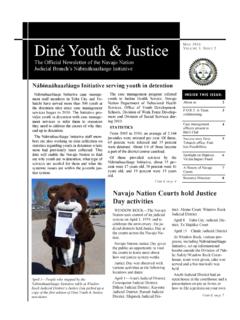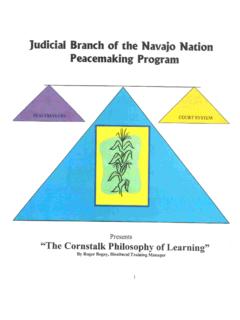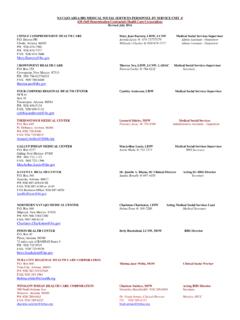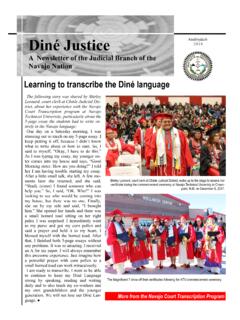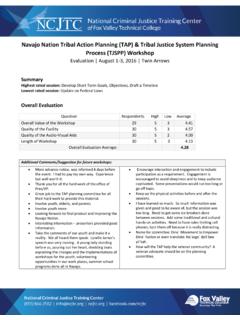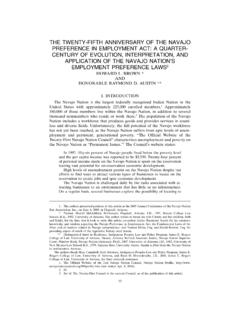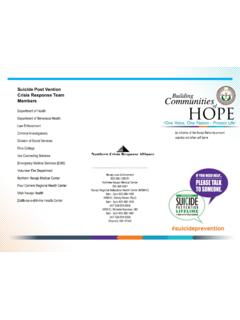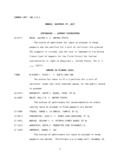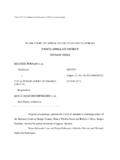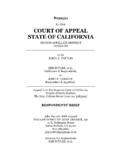Transcription of IN THE FAMILY COURT OF THE NAVAJO NATION …
1 IN THE FAMILY COURT OF THE NAVAJO NATION judicial district OF ANETH, UTAH IN THE MATTER OF: ) ) NO: AN-FC-09-000121 (CV) DAVIS BIG BEN, C# 214, 946, ) DOB: 02/27/1975, ) ) ORDER DENYING MOTION Alleged Incompetent Adult, ) TO DISMISS ) AND CONCERNING: ) ) JEANNETTE BIG BEN, C# 126,679, and ) ELWOOD BIG BEN, C# 019, 221, ) ) Petitioners/Adoptive Parents. ) _____) A Petition for Adult Guardianship was filed in the above captioned matter on July 16, 2009.
2 Davis Big Ben filed a Motion to Dismiss on November 17, 2009. The basis of the motion is that the NAVAJO law covering adult guardianship violates an individual s right to due process: the law s lack of specificity and clear procedure do not adequately protect an individual s liberty interest in the determination of whether a guardian is necessary or in the determination of the controls imposed either upon an appointed guardian or the guardianship process in general. A hearing to consider the motion was held on May 6, 2010. Present at the hearing were Petitioners Jeannette and Elwood Big Ben, along with their attorney, Matthew Van Wormer of DNA-People s Legal Services, Inc., and Davis Big Ben, represented by Therese Yanan of Native American Disability Law Center, Inc.
3 Based upon the arguments presented at the hearing, the memoranda submitted by both parties in regard to this motion and the other pleadings and documents submitted in this matter, the COURT denies Mr. Big Ben s Motion to Dismiss. This is based upon the following grounds: 2 1. The COURT agrees with both parties that the statutes in regard to adult guardianships are meager, with little to no guidance on how to proceed in order to guarantee the protection of rights of adults who are the subject to adult guardianships. There are only five short sections concerning such guardianships under NAVAJO law, Sections 801 et seq. under Title Nine of the NAVAJO NATION Code. There are no rules of procedure for these proceedings, rules that have been provided for other NAVAJO statutes that are similarly vague or minimal, rules that have been provided in such statutory schemes as probate, repossession or the calculation of child support.
4 2. Some guidance may perhaps come from the Health Commitment Act of 2006, 13 NAVAJO NATION Code 2101 et seq., which provides detailed procedures and standards for the involuntary commitment of individuals who for one reason or another have become a danger to themselves and/or others. However, the liberty interests and circumstances of individuals who are subject to adult guardianships may be significantly different from those subject to the Health Commitment Act so that the same procedures are not appropriate for both in all aspects. 3. The COURT agrees with Davis Big Ben that the liberty interest, as protected under 1 NAVAJO NATION Code 3 is important: nor shall any person within its jurisdiction .. be deprived of life, liberty or property, without due process of law.
5 It is part of NAVAJO tradition that individual liberty is highly protected and respected. There was no such thing as jails or confinement imposed by society before Europeans appeared and placed their own concepts of justice and social norms on Navajos. This traditional antipathy to confinement is reflected in the procedures under the Health Commitment Act of 2006, which does not permit confinement of individuals in jails even if they are found to be a danger to themselves or others. 13 NAVAJO NATION Code 2104(A). Confinement in jails is permitted only for approved protective custody 3for a very short period at the initial stage of proceedings. 13 NAVAJO NATION Code 2109 (A). This restriction on confinement is different from most other tribal governments in the Southwest which will hold individuals in jail, sometimes for significant periods of time, before a person can be placed in an appropriate state hospital or other mental health facility.
6 The COURT notes that states are not generally faced with this dilemma because they have adequate health facilities of their own where individuals can be confined as an alternative to jail facilities. 4. The high regard for individual liberty is also reflected in the NAVAJO expression, T aabi boholn88h roughly translated as It is up to the person. See In the Matter of the Custody of , 8 Nav. R. 78, 86 (Nav. Sup. Ct. 2001). While Navajos place a great emphasis on the responsibilities that people have to one another under k 4 and the importance of meeting those responsibilities, Navajos also allow persons to go their own way and make their own choices without control or forceful guidance from others. This value is included in child rearing, in that children from an early age are allowed to make their own decisions, which then are respected and accepted.
7 Such a high regard for individual choice and the freedom to make one s own choices indicate that proper procedures must insure that limitations placed on individual freedoms should not be permitted by government without proper due process. 5. The COURT agrees with Petitioners that it is too soon in this proceeding to determine if from the outset the minimal guidance provided by the statutes would on their face prevent due process. The Motion to Dismiss was filed at the initial stage of proceedings in this case, and it is not directed at any failures of the COURT or the specific facts in this proceeding. Mr. Big Ben has not asserted any particular limitations applicable to him in this proceeding that violate due process. His argument is limited to the general assertion that the scanty statutes could not per se provide adequate protection to his liberty interests.
8 This limitation would apply 4equally to all persons over whom an adult guardianship is sought, which of course would also include him. 6. The facts asserted thus far do not suggest that applying 9 NAVAJO NATION Code 801 et seq. to this case would be a significant roadblock to Mr. Big Ben s liberty. Because the COURT has not entertained any evidence at this stage, the facts may indicate otherwise at a later time. However, presuming the validity of what the COURT has been presented so far, the COURT finds that it can proceed under current law along with certain standards it will impose to make sure that Mr. Big Ben s liberty interests are protected in this matter. 7. Petitioners adopted Mr. Big Ben when he was five years old. Petitioners are the parents of Mr.
9 Big Ben s mother. According to a report issued in regard to the 1980 adoption the Report of the Bi-State Social Services, Chinle Regional, when Mr. Big Ben was an infant he suffered a non-accidental trauma to his head and brain which was not treated with timely medical care to prevent permanent injury. 8. Mr. Big Ben s adoptive parents ask in their petition that they be given permanent legal guardianship over Mr. Big Ben s person and estate. The specific nature of the guardianship was not specified. The COURT notes that attached to the petition is a letter dated June 18, 2009, from Dr. John Kozik, , of the Four Corners Regional Health Clinic. Dr. Kozik at that time was treating Mr. Big Ben for several chronic medical conditions. His letter stated that Mr.
10 Big Ben does not have the capacity to understand options/risks and benefits of medical treatment and is incompetent to make his own medical decisions. Mr. Bigben (sic) does not have the capacity to give informed consent. 9. The COURT presumes that Petitioners will at least ask that they be granted guardianship powers over medical decisions. Nothing in the petition suggests that Mr. Big Ben s 5living arrangements will change from what they have been for the last thirty years: living at home with his adoptive parents, who are also his maternal grandparents. 10. The COURT finds that this case may proceed because nothing at this point in time has violated his rights to due process. Moreover, the requirements the COURT shall make that apply to adult guardianship proceedings will insure his liberty interests will continue to be protected.

